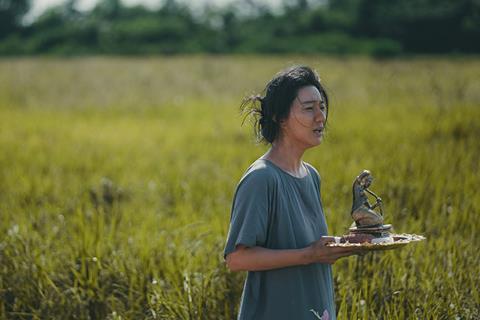Director Chong Keat-aun’s Tokyo premiere is an uneasy blend of political commentary and supernatural mysticism

Dir/scr: Chong Keat-aun. Malaysia. 2025. 129mins
Malaysian director Chong Keat-aun mixes history, ethno-religious diversity, female body autonomy and supernatural mysticism to compelling if sometimes diaphanous effect in his fourth feature, which premieres in Tokyo competition. Set in a multi-ethnic village on the Thailand-Malaysia border in 1998, a politically fraught time in many parts of Asia, the ambitious Mother Bhumi navigates the thorny legacy of colonial policy in a story about a widowed rice farmer and shaman healer attempting to help her neighbours with their emerging land claims.
The secret weapon here is Fan
Chinese superstar Fan Bingbing is almost unrecognisable in the central role of Hong Im. It’s a refreshing change of pace for the actor, known better for the gloss of films like The 355 and I Am Not Madame Bovary, and has secured her a Golden Horse nomination for best actress (one of eight the film has received, including best director and best narrative feature). Lushly photographed, frequently mesmerising in its deliberate quietude – thanks in part to a thrumming, bassy score by Chong and Yii Kah-ho – and undeniably thought-provoking, Mother Bhumi’s reach too often exceeds it grasp to cohere as a single narrative.
That does not mean the film is without considerable merit, or is ever less than watchable. Chong has been down this thematic road before, and is arguably among Malaysia’s most vocal cinematic social critics. With films like Pavane For An Infant (2024), Snow In Midsummer (2023) and The Story Of Southern Islet (2021), Chong has never shied away from exploring the inherent conflicts within Malaysian society, and that reflectivity – together with Fan’s name above the title – should secure Mother Bhumi significant festival play. Distributors with a track record of nuanced art house indies, or Chong’s earlier work, should also take note.
The story begins with Hong performing a healing ritual on a pregnant woman, one of the many roles she play in her rural Kedah district village in Malaysia’s Bujang Valley. Later, the woman is hit by a truck and killed in what turns out to be a crucial moment.
The film’s late nineties setting is a time of economic crisis and political volatility that saw the departure of deputy prime minister Anwar Ibrahim (who is now the country’s current PM) following controversial sodomy charges and widespread demand for reform. Among those are calls to address the impact of a 1909 treaty made between the UK and the former Kingdom of Siam (now Thailand), which established the modern border between Thailand and Malaysia and ceded a swathe of southern Thailand to the British. In 1998, the Malaysian government is in the course of reclaiming the land for native Malays. Hong’s friend Har (Pearlly Chua) is one of many residents that have held land for generations and are now in danger of it being taken from them if they don’t sell and move away. Hong’s deceased husband worked at the land bureau, so she thinks she may have some sway.
When she’s not doing paperwork, Hong is a healer and, essentially, exorcist, banishing demons from Buddhist, Confucian or Muslim sufferers in equal measure. Her children react differently to her shaman work, with her vaguely racist daughter Boon (Natalie Hsu, who like Chua co-starred in Pavane) dismissing the rituals and lambasting Hong for neglecting her in favour of “them.” Son Koon (Bai Run-yin) is, however, following in her shamanistic footsteps. Late in its third act Mother Bhumi takes a turn for the overtly supernatural, introducing a story thread involving Hong’s dead husband – who may or may not be possessing the family buffalo – and a dark secret that brings the story full circle in a ghostly finale.
Chong is adept at locating the intersections of nationality, religion and ethnicity, but here the connection he tries to make between land rights and women’s autonomy is a tenuous one. In weaving together the magical and the realistic, Chong muddies the waters and unintentionally dilutes messages that may work better in two distinct films.
Comprised almost exclusively of medium and long shots (including a tremendously evocative overhead sequence of Har being healed), cinematographer Leung Ming-kai’s compositions capture the beauty of the green fields and rice paddies, and provide a physical context for the action. Yet the political backdrop is less illuminated, and anyone with only a passing knowledge of the history of the region could be at a loss. The secret weapon here is Fan; working in the grittier mode she demonstrated in Green Night (2023), she ably carries Mother Bhumi to its enigmatic conclusion.
Production companies: Janji Pictures
International sales: Rediance, info@rediancefilms.com
Producers: Wong Kew-soon, Stefano Centini, Zoey Teng,
Cinematography: Leung Ming-kai
Production design: Soon Yong-chow
Editing: Erik Moh
Music: Yii Kah-hoe, Chong Keat-aun
Main cast: Fan Bingbing, Natalie Hsu, Bai Run-yin, Pearlly Chua
























